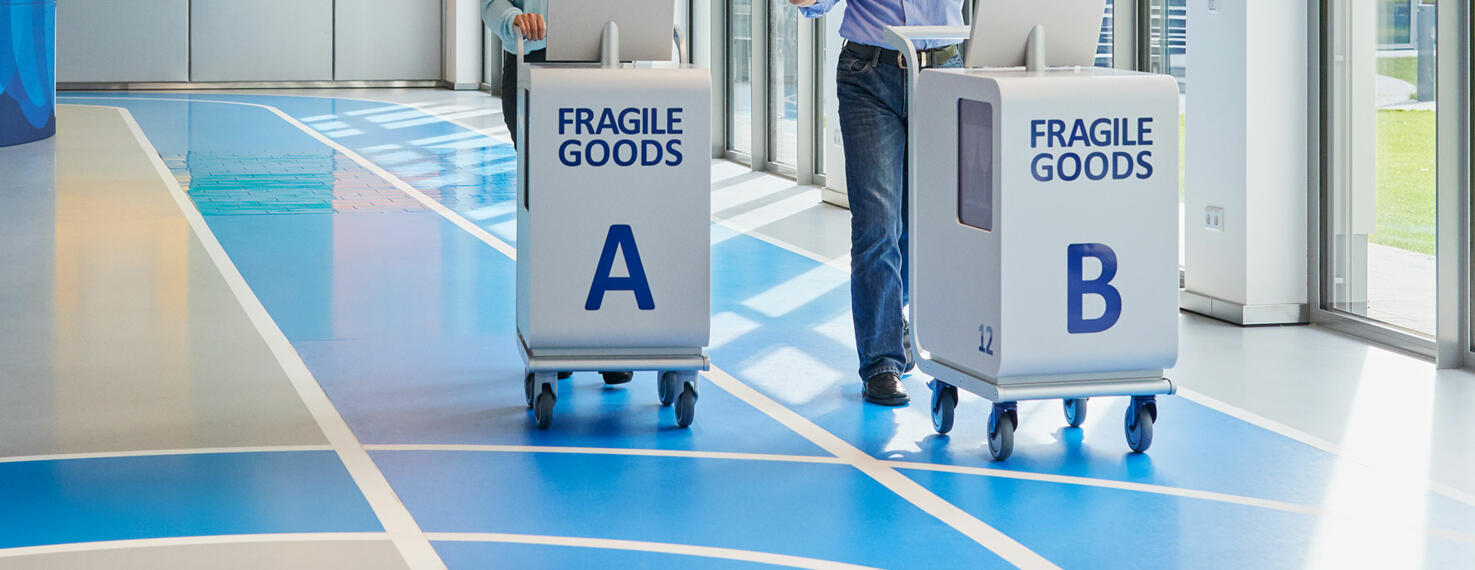
Lexicon: T
The right casters for industrial and outdoor areas
The floor conditions influence the decision regarding which castors to choose. The basic principle is – for hard floors, use soft castors, and, conversely, for soft floors use hard castors.
Floors in industrial areas are not always as smooth and flat as those in residential and office areas. Casters in these settings often have to roll on uneven or rough surfaces. This places higher demands on the tread and there are other special requirements that must be taken into account. The wheels or casters must not leave impressions or dents in the floor and the material must be resistant to chemicals, heat, aging and more.
For example, polyamide or polyurethane wheels, are suitable for smooth and even floors. They are low-noise, gentle to floors and have a low rolling resistance. Cast-iron wheels with PUR tread can be used on rough, but flat floors. Another option would be a polyamide wheel body with a polyurethane tire. Such wheels are extremely wear and abrasion resistant and they provide smooth and quiet operation.
For smooth but uneven floors, pneumatic tires are recommended. These can overcome minor obstacles and they are shock-absorbing. To prevent damage to the tires, always ensure they have the correct air pressure.
Cast iron wheels or wheels with elastic-rubber tread are ideal for factory environments with rough and uneven floors as well as for outdoor areas.
Cast iron wheels are extremely impact resistant and are therefore suitable for exacting load requirements. They have a very long service life and low wear on the tread. The elastic rubber wheels have a hard rubber core with a soft tread and roll easily. The rolling resistance is low.
The right casters for corporate offices and outside areas
In industrial environments, the floors are not always as smooth and even as in residential and office areas. Casters in these settings often have to run on uneven or rough surfaces. This places higher demands on the tread. Additionally there are other special requirements that must be taken into account. The wheels and casters must not cause any indentations in the floor and the material must be resistant to chemicals, heat, aging and more.
Suitable wheels for smooth and even floors are those made of polyamide or polyurethane, being low-noise, kind to floors and with low rolling resistance. For rough but flat floors, on the other hand, cast-iron wheels with a PUR tread can be used, for example. Another option would be a polyamide wheel center with a polyurethane tire. Wheels such as these are extremely wear and abrasion resistant and simultaneously smooth running.
If the ground is smooth but uneven, pneumatic tires are recommended. These can overcome minor obstacles and are shock-absorbing. It must always be ensured that the wheels have the correct air pressure so that the tire surface is not destroyed.
For operating areas with a rough and uneven floor, as well as outside areas, cast iron wheels or wheels with an elastic-rubber tread surfaces are ideal. Cast iron wheels are extremely impact resistant and are therefore suitable for exacting load requirements. They have a very long service life and low wear on the tread. The elastic rubber wheels have a hard rubber core with a soft tread and run very easily. They have a low rolling resistance .
Other factors in the selection of castors
In addition to the actual state of the floor, other factors must be taken into account. These include electrical conductivity. In some applications, the castors must be electrically conductive or antistatic to prevent potentially dangerous electrostatic discharges. Also, black wheels may leave marks on light-coloured surfaces. To prevent this from happening, non-marking wheels can be used.
